With top ratings on the parameters of faculty competence, faculty development and welfare, research and innovation, and infrastructure, Manipal University has leapfrogged BITS, Pilani and IIIT, Hyderabad to the top of EWIPUR 2016: Dilip Thakore
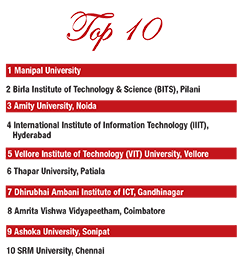 The Manipal (Karnataka)-based Manipal University (MU, estb.1953) — accorded the status of deemed (private) university in 1993 — which provides medical, engineering, business and hotel management, pharmacy, nursing and paramedical education to 30,000 students in its 22 colleges, has been voted India’s #1 private university by the 4,465 sample respondents polled in the EducationWorld India Private University Rankings (EWIPUR) 2016. Ranked #3 among private universities and #15 overall in 2015, this year, with top ratings on the parameters of faculty competence, faculty development and welfare, research and innovation and infrastructure, MU has leapfrogged the Birla Institute of Technology and Science (BITS), Pilani and the International Institute of Information Technology, Hyderabad, ranked first and second in 2015, to the very top of the EW private universities league table.
The Manipal (Karnataka)-based Manipal University (MU, estb.1953) — accorded the status of deemed (private) university in 1993 — which provides medical, engineering, business and hotel management, pharmacy, nursing and paramedical education to 30,000 students in its 22 colleges, has been voted India’s #1 private university by the 4,465 sample respondents polled in the EducationWorld India Private University Rankings (EWIPUR) 2016. Ranked #3 among private universities and #15 overall in 2015, this year, with top ratings on the parameters of faculty competence, faculty development and welfare, research and innovation and infrastructure, MU has leapfrogged the Birla Institute of Technology and Science (BITS), Pilani and the International Institute of Information Technology, Hyderabad, ranked first and second in 2015, to the very top of the EW private universities league table.
“Manipal University has risen to the top in the public esteem because of sustained effort and teamwork of the administration, faculty and successive batches of students who have succeeded in their businesses and professions all over the world. Such institutional synergy always produces great results,” says Dr. Ramdas Pai, chancellor of MU who has played a major role in transforming Manipal (pop. 35,000) into India’s premier university town, and in establishing MU-affiliated colleges and universities in Sikkim, Malaysia, Dubai, and Antigua (West Indies) after he took charge following the death of MU’s legendary founder Dr. T.M.A Pai (1898-1979). Currently, the Manipal Education Group comprises 55 private education institutions with an aggregate enrolment of 167,000 students in India and abroad.
Dr. H. Vinod Bhat, FRCS and an alumnus of Glasgow University, who signed up with MU in 1988 and was appointed vice chancellor of the university last June, is also delighted that MU has been ranked India’s #1 private university by the informed sample respondents of EWIPUR 2016. Bhat is particularly enthused about this off-the-beaten-track varsity’s top rating on the parameter of research and innovation. “In recent years, we have made a conscious effort to expand our research capacity in the life and natural sciences, virology and biomedical engineering, and MU has emerged as a national hub of embryology, genetics and social science research. Intelligent investment in globally benchmarked science and medical infrastructure has attracted substantial domestic and international research grants. I am also happy with MU’s top rank on the parameters of faculty competence, development and welfare which drives the research capability we have developed. Moreover, the top rating we have received on infrastructure validates my point about sustained intelligent infrastructure development,” says Bhat.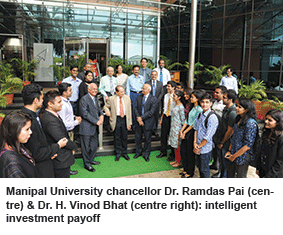
In this year’s league table of India’s best private universities, MU is followed by last year’s top-ranked Birla Institute of Technology & Science, Pilani and Amity University (#1 and #4 in 2015), International Institute of Information Technology, Hyderabad (#4), and VIT University, Vellore (5). The next half of the Top 10 table is made of Thapar University, Patiala (6), Dhirubhai Ambani Institute, Gandhinagar (7), Amrita Vishwa Vidyapeetham, Coimbatore (8), Ashoka University, Sonipat (9) and SRM University, Chennai (10).
Further down the league table, the Pune-based Symbiosis International (#11) and Shiv Nadar University (12) as also Azim Premji University, Bangalore (15), and the previously unranked IIIT, Bangalore (19) have made great leaps forward in the esteem of the informed public to be ranked among India’s Top 20 private universities.
“The popularity of India’s private universities is growing nationally and internationally because we focus on contemporary education to make students industry-ready. In the case of Amity, our goal is to also train them to become employment providers rather than employment seekers. We cannot afford to bask in past glory and achievements. We believe we have an obligation to continuously prove excellence in teaching and research, and deliver value on all parameters. That said, it’s a great achievement for Amity, which is only ten years of age, to be ranked nationally among India’s Top 3 private universities which were started five-six decades earlier, and to be top-ranked in Uttar Pradesh, India’s most populous state which, in fact, is a country in itself. The credit for this achievement goes to our diligent faculty who are continuously improving Amity’s teaching and research standards. This assertion is supported by the high ratings we have been awarded under the parameters of research and innovation and competence of faculty,” says Dr. Atul Chauhan, an alum of the London School of Economics and University College, London, and currently chancellor of the first Amity University, Noida (estb.2003).
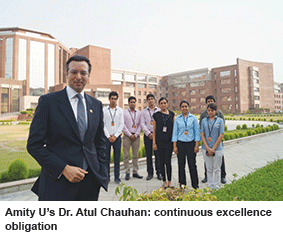 Since then, Atul together with his father Dr. Ashok K. Chauhan and brothers has masterminded the establishment of eight autonomous Amity universities in India, and 11 campuses abroad with an aggregate enrolment of 125,000 students and 6,000 faculty. Commendably, four other Amity universities — Manesar, Gurgaon (51), Jaipur (73), Gwalior (77) and Raipur (94) — are ranked among the country’s Top 100 private varsities in EWIPUR 2016.
Since then, Atul together with his father Dr. Ashok K. Chauhan and brothers has masterminded the establishment of eight autonomous Amity universities in India, and 11 campuses abroad with an aggregate enrolment of 125,000 students and 6,000 faculty. Commendably, four other Amity universities — Manesar, Gurgaon (51), Jaipur (73), Gwalior (77) and Raipur (94) — are ranked among the country’s Top 100 private varsities in EWIPUR 2016.
Indeed, unprecedented scaling is the hallmark of the Chauhan clan which comprises five highly-educated brothers who seem determined to engineer and establish over a score of American Ivy League-style universities in India. Since Amity University, Noida admitted its first batch of aspirational undergrads into its sprawling steel and glass US-style 60-acre campus, the Chauhan clan has promoted autonomous state government legislation-enabled universities in Lucknow, Gurgaon, Jaipur, Mumbai, Gwalior, Kolkata and Raipur with new varsities in Patna, Chhattisgarh, Jharkhand, Nagaland and Andhra Pradesh in the pipeline. Moreover, Amity University campuses are up and running in London, Singapore, New York, California, Dubai, Mauritius, Beijing and Nanjing with plans to inaugurate campuses in Australia, New Zealand and Canada on the brothers’ drawing boards.
Although this break-neck expansion of the Amity Group — also one of the country’s most ubiquitous advertisers on national television channels — is anathema to unaccountable Left academics comfortably tenured in public universities who routinely deplore the “commercialisation of education”, the fact that 125,000 youth have signed up for relatively expensive (Rs.36,000-2 lakh per annum) Amity study programmes in India and abroad, indicates that Chauhan pere et fils have accurately judged the pent-up demand for new genre higher education, and priced their 250 programmes in 60 disciplines correctly. “It’s just the beginning of a long journey towards globally-accepted excellence and there are many more miles to be covered in the shortest possible time,” says Atul Chauhan.
Yet perhaps the most meteoric rise in the esteem of the informed public in recent years, has been of the Sonepat (Haryana, Delhi NCR)-based Ashoka University (AU), promoted in 2014 as India’s first crowd-funded (85 major donors) liberal arts institution.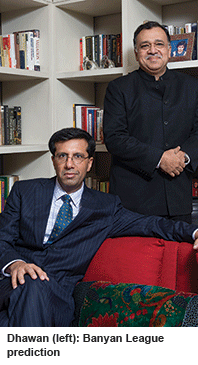
Ranked #14 among private universities last year, it has vaulted into the Top 10 (with a #1 ranking in the state of Haryana) this year with high scores on the parameters of competence of faculty and teacher welfare and development. A boutique university with 570 mainly undergrad students from 26 states of the Indian Union and eight countries abroad, since it admitted its first batch of 133 students in August 2014, AU has quickly established a reputation as India’s top liberal arts university and an acceptable substitute for ruinously expensive Ivy league varsities in the US. In 2015, this two-year-old university established under special legislation enacted by the Haryana state government, received 5,500 admission applications against its 430 undergrad vacancies.
“Ashoka has always set a high bar for itself. Our aspiration is to build the top liberal arts university in India and one of the best in the world. Given the public focus on professional degrees across the country, Ashoka with its focus on liberal arts education has established a national reputation in a very short period of time. We admitted our first batch only two years ago and Ashoka is already considered a top choice for students and faculty in the humanities, social and natural sciences. Our early success and Top 10 ranking demonstrates that there’s huge latent demand for liberal arts education and we hope other institutions will follow our path,” says Ashish Dhawan, the Harvard-educated former CEO of Chrysalis Capital, speaking on behalf of the ‘Big Four’ founder-trustees of AU (the other three: Sanjeev Bhikhchandani, Vineet Gupta and Pramath Sinha).
Dhawan’s high opinion of the excellent faculty attracted by this newbie university is endorsed by the sample respondents of EWIPUR 2016. Although AU is ranked #9 in the composite league table, on the parameters of competence of faculty and pedagogic systems and processes, it’s ranked #2 and #3 nationally. “Our faculty comprises leading scholars from around the world. Ashoka already has 40 full-time and 25 visiting professors and we received 800 applications for 20 vacant faculty positions last year. Many of our professors have left the best institutions in the US to accept AU tenures, and include Alex Watson from Harvard and Saikat Majumdar from Stanford, among others. Several new private universities that have been promoted in the recent past — Shiv Nadar, Jindal Global, Azim Premji — and the high standards they have set themselves, are starting to change the public perception of private universities. I believe the Banyan League — an Indian equivalent of America’s Ivy League universities — has started to emerge,” says Dhawan.
Beyond the Top 10, the Pune-based Symbiosis International University (SIU, estb.1971) has also risen in informed public opinion to be ranked #11 nationally in this year’s private universities league table — a big jump from its #29 rank in 2015.
Perhaps more pertinently, SIU, which with students from 85 countries is arguably India’s most international university, is ranked #1 in Maharashtra (pop.112 million), the country’s most industrialised state with high ratings on the parameters of competence of faculty and industry interface.
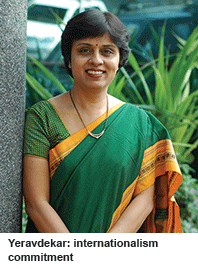 “The high ranking your sample respondents have given SIU this year is very heartening and encouraging. Also being ranked Maharashtra’s leading private university is a matter of great pride for all of us. Almost 65 percent of higher education in India is provided by private education institutions which offer professional programmes and proficiencies that make students employable. Therefore, a premier ranking among private universities is valuable recognition,” says Dr. Vidya Yeravdekar, a law and medicine alumna of Pune University and principal director of the Symbiosis Society, which has promoted seven primary-secondary schools and 40 institutions of higher and professional education including Symbiosis International University, with an aggregate enrolment of 33,000 students including 3,000 from abroad.
“The high ranking your sample respondents have given SIU this year is very heartening and encouraging. Also being ranked Maharashtra’s leading private university is a matter of great pride for all of us. Almost 65 percent of higher education in India is provided by private education institutions which offer professional programmes and proficiencies that make students employable. Therefore, a premier ranking among private universities is valuable recognition,” says Dr. Vidya Yeravdekar, a law and medicine alumna of Pune University and principal director of the Symbiosis Society, which has promoted seven primary-secondary schools and 40 institutions of higher and professional education including Symbiosis International University, with an aggregate enrolment of 33,000 students including 3,000 from abroad.
Dr. Yeravdekar takes special pride in the fact that SIU, promoted by her father Prof. S.B. Mujumdar in 1971, has true to his vision, established a national reputation as a premier international university offering business management, law, humanities and social, health & biomedical sciences, computer studies, engineering, media communication and design undergrad and postgraduate education in its seven institutes grouped under SIU. “SIU was promoted by my father 45 years ago for international peace, harmony and understanding through quality education. SIU’s motto is vasudhaiva kutumbakam — ‘the world is one family’. Therefore right from the start, we have been forging symbiotic relationships between foreign and Indian students, providing high-quality education which blends Eastern wisdom with Western dynamism. The good reputation of SIU reflected in the EducationWorld rankings is because we provide quality education with strong industry-academia linkages which ensures holistic development and equips students with the necessary skills and competencies that enable them to become globally employable,” says Yeravdekar.
Further down the private varsities Top 20 list perhaps inevitably, the Gautam Buddha Nagar (UP Delhi NCR)-based Shiv Nadar and Bangalore-based Azim Premji universities, promoted by the eponymous IT tycoons, have also risen sharply in the public esteem to be ranked #12 (cf. #24 in 2015) and 15 (21). And while the Mumbai-based NMIMS University has yielded ground to be ranked #14 this year, the previously unranked BIT, Mesra (17), IIIT, Bangalore (19), SASTRA, Thanjavur (13), KIIT University, Bhubaneswar at 16 (18) and Sri Ramachandra Medical College, Chennai at 18 (25) have improved their rankings in 2016. And below the Top 20 somewhat surprisingly, Christ, Bangalore, PES, Bangalore and O.P Jindal, Sonepat (Haryana) private universities have lost rank from last year.
Although inclusion in EW’s as-objective-as-possible Top 100 private universities league tables compiled by professional market research and opinion polls company C fore, is a signal honour given that the total number of private universities countrywide is 232, promoters, vice chancellors and faculty of varsities which don’t make it into the Top 10/20 ranks can derive comfort from high state rankings. And given that the great majority of India’s 29 states are larger and more populous than the average European country, high ranking in state league tables is not to be sniffed at. As mentioned above, although Symbiosis International University, Pune is not ranked among the national Top 10, it is top-ranked in Maharashtra (pop. 112 million), India’s most industrialised state. And Amity has two universities ranked among the Top 5 in Uttar Pradesh (pop. 200 million), no mean achievement.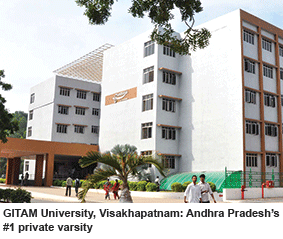
In light of the huge distances from home that often need to be traversed to access top-ranked colleges and universities, and wide cultural differences between the states of the Indian Union, the great majority of school-leavers prefer to enroll in institutions within the boundaries of the country’s linguistically demarcated states. And given the reality that the great majority of state government colleges countrywide tend to be poorly managed and governed, high rank in the EWIPUR 2016 state league tables are of considerable significance.
Therefore, the top ratings and rankings awarded by the 4,465 EW sample respondents to GITAM (Gandhi Institute of Technology & Management) University in Andhra Pradesh (pop.49 million), Dhirubhai Ambani Institute of Information and Communication Technology, Gandhinagar (Gujarat, pop.63 million), Shoolini University (Himachal Pradesh, 6.8 million), Jagran Lake University, Bhopal (Madhya Pradesh, 73 million), KIIT University, Bhubaneswar (Odisha, 44 million), BIT, Mesra (Jharkhand, 32 million), Assam Don Bosco University, Guwahati (Assam, 31 million) and Amity University, Raipur (Chhatisgarh, 28 million) assume great significance for youth planning their higher education ( see pp.56-57).
Moreover, to inform parents/students about the relative ratings of the Top 100 private universities under the seven parameters of academic excellence used in this exhaustive survey spread over four months, during which 200 C fore field representatives interviewed the 4,465 informed sample respondents, separate Top 10 parameter tables are presented on pp 58-59. Investing household savings in relatively more expensive private education is a serious undertaking and we recommend that the national, state and parameter league tables are studied carefully.
Also read: India’s top 100 private universities 2017-18























